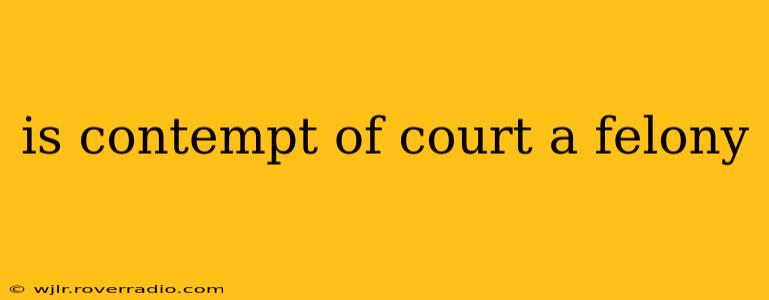Is Contempt of Court a Felony? The Complexities of a Serious Offense
Contempt of court is a serious offense, but whether it's classified as a felony depends heavily on the specifics of the case and the jurisdiction. There's no simple yes or no answer. Let's explore the nuances.
What is Contempt of Court?
Contempt of court broadly refers to any act that obstructs or interferes with the administration of justice within a court of law. This can take many forms, ranging from relatively minor infractions to egregious offenses. The core principle is that the court's authority must be respected to ensure the fair and efficient operation of the legal system.
Types of Contempt:
Contempt is generally categorized into two main types:
-
Direct Contempt: This occurs in the presence of the court, such as disruptive behavior during a trial, refusing to answer a judge's questions, or physically assaulting someone within the courtroom. It's usually dealt with immediately by the judge.
-
Indirect Contempt (or Constructive Contempt): This happens outside the courtroom and involves actions that obstruct the court's proceedings, like failing to comply with a court order, such as refusing to pay child support or failing to appear for a scheduled hearing. This requires a separate hearing to determine guilt.
Felony vs. Misdemeanor Classification:
The classification of contempt (felony or misdemeanor) is determined by several factors:
-
Jurisdiction: State and federal laws vary significantly in how they define and punish contempt of court. Some states may treat all forms of contempt as misdemeanors, while others may classify certain egregious acts as felonies. Federal courts have their own rules and sentencing guidelines.
-
Severity of the Offense: The seriousness of the action contributing to the contempt charge heavily influences the classification. Minor infractions are far more likely to be treated as misdemeanors, while deliberate and substantial defiance of court orders, particularly those affecting public safety or the integrity of the judicial system, might be elevated to felonies.
-
Intent: The judge will consider whether the act was intentional or accidental. Intentional defiance is more likely to result in a more serious charge.
-
Past History: A history of contempt charges can lead to harsher penalties, potentially influencing the classification of a current offense.
Penalties for Contempt of Court:
Penalties vary widely, but can include:
- Fines: Monetary penalties can range from minimal to substantial amounts.
- Jail Time: Contempt can lead to imprisonment, from short sentences for minor offenses to lengthy prison terms for serious felonies.
- Community Service: This might be ordered as an alternative or in addition to other penalties.
Frequently Asked Questions
H2: What are the penalties for contempt of court?
Penalties for contempt of court vary greatly based on the specifics of the case and the jurisdiction. They can include fines, jail time, and community service. The severity of the punishment corresponds to the severity of the contempt. Minor infractions might lead to small fines, while more significant breaches of court orders can result in substantial fines and lengthy prison sentences.
H2: Can you go to jail for contempt of court?
Yes, you can go to jail for contempt of court. Jail time is a common penalty, particularly for indirect contempt (failure to comply with a court order) or for direct contempt involving significant disruption or defiance. The length of the sentence will depend on the severity of the offense and the judge's discretion.
H2: Is failing to appear in court contempt of court?
Yes, failing to appear in court is typically considered contempt of court. This is a form of indirect contempt, as it occurs outside the immediate presence of the court but still interferes with its proceedings. Failure to appear, especially without a valid excuse, can result in a warrant for your arrest and penalties as outlined by the court.
Conclusion:
Determining whether contempt of court is a felony requires examining the specific circumstances of each case, the jurisdiction, and the severity of the infraction. While some instances might result in misdemeanor charges, serious and willful defiance of court orders can indeed lead to felony charges and significantly more severe penalties. It is crucial to understand the gravity of contempt of court and to fully comply with all court orders to avoid potentially dire consequences.
